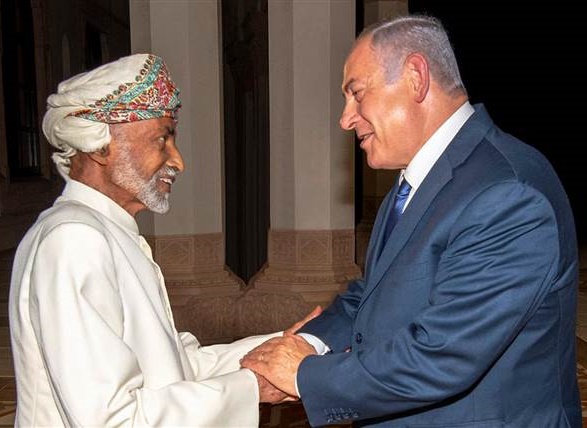
«Israel», Gulf States Are Going Public with Their Relationship
By Staff, Bloomberg
Al-Ahed News,
November 2019

Business ties and warming
diplomatic relations between the “Israeli” entity and its
neighbors in the Gulf have been an open secret for years.
Those ties will be unveiled with fanfare next October
when “Israel” opens its pavilion at the World Expo in Dubai, the
United Arab Emirates’ largest city. Participating is like
setting up an embassy that will last only six months: Close
coordination between the entity and its host will be required on
myriad and mundane tasks, including hiring builders and planning
ancillary events. It may seem like a substance-free event, but
the “Israeli” entity’s presence among the more than 190 other
countries is a clear sign of the Middle East’s changing
geopolitical picture.
Normalizing relations with Arab countries has been a
priority for the “Israeli” entity. In October 2018, the entity’s
so-called Prime Minister Benjamin Netanyahu made international
headlines with his visit to Oman. Participating in the fair
“reflects ‘Israel’s’ growing position not only in the world but
also in the region,” said the entity’s Foreign Minister Israel
Katz in a statement.
The “Israeli’ entity’s participation in the expo has
been made possible in part by shifting regional priorities,
namely the emphasis on confronting Iran for countries such as
the UAE and Saudi Arabia. Those states also want the enhanced
international standing that hosting global events brings, as
well as access to "Israeli" technology. Meanwhile, the
“Israeli”-Palestinian conflict, long one of the region’s most
pressing issues, has fallen from the top of leaders’ agendas.
The promised release of the White House’s “Deal of the Century”
peace plan could crystallize the changing dynamics.
That said, the “Israeli” entity remains a sensitive
issue across the Arab world. While the international body that
coordinates the World Expo said it’s up to host nations to
invite other countries, the UAE Ministry of Foreign Affairs and
International Cooperation referred questions about "Israel’s"
participation to event organizers. Expo 2020 Dubai spokesman
David Bishop says it’s an “apolitical event” and “the real
significance is not about the participation of any single
country, it’s about the UAE living up to its obligations when
hosting global mega-events.”
The Palestinians will also have a pavilion at the expo;
for them, the “Israeli” entity’s participation is a similarly
thorny issue. They’re vigilant for any sign of distance between
them and their Arab allies, but also haven’t vocally criticized
the entity’s participation, dependent as they are on aid and
goodwill from the Gulf states.
The “Israeli” apartheid regime expects millions of
visitors to stop by its “Towards Tomorrow”-themed exhibition,
which will tout the country’s advances in everything from
medical technology to water management. The pavilion itself –
1,500 square meters [16,146 square feet] nestled between India’s
and Italy’s – is inspired by sand dunes, says pavilion architect
David Knafo. Along with promoting technological advances, there
will be original music, and a popular Arabic-speaking television
presenter will preside. The “Israeli” regime expects to spend
more than the $15.5 million it laid out for the 2015 expo in
Milan, even as “Israeli” media reports funding shortfalls that
are restricting diplomats’ spending.
Katz and other officials have visited the UAE before,
and “Israel” opened an office in Abu Dhabi to represent it at
the International Renewable Energy Agency. Much remains to be
done before the opening of the expo, however. Contractors and
consultants to handle electricity, architecture, and safety must
be hired; the organizers still need to approve the technical
plans for the pavilion; and the program must be fleshed out.
Elazar Cohen, the entity’s so-called foreign ministry’s point
person on the project, has been flying back and forth to Dubai
and working for about a year on the arrangements. He hasn’t
encountered any major difficulties with the organizers so far –
indeed, just the opposite. “You feel the interest from their
side,” says Cohen. “They are trying to give us the feeling that
everything is normal, we are as any other country.”
The smooth process also bodes well for furthering
commerce between the “Israeli” entity and the Arab Gulf states.
Fields such as cybersecurity and agritech are areas where they
can work together, enhancing ties that begin at the political
level. “Besides just the leaders talking,” says Erel Margalit,
founder of Jerusalem Venture Partners, “entrepreneurs are
connecting, and maybe that’s an element of real change.”
See also original Bloomberg article (24th October
2019):
Israel and Gulf States Are Going Public With Their Relationship




































